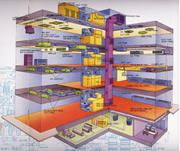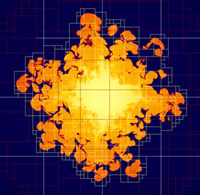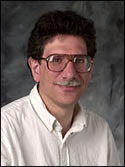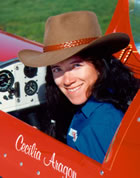


Four Berkeley Lab researchers were awarded nearly $1.2 million in funding through the American Recovery and Reinvestment Act last week for work on energy-efficient buildings. The DOE announced a total of more than $75 million for 58 projects in advanced energy-efficient building technologies. Buildings account for approximately 40 percent of U.S. primary energy consumption, as well as 39 percent of carbon dioxide, 18 percent of nitrogen oxides, and 55 percent of sulfur dioxide emissions, according to the DOE.
Although national labs were not eligible to be prime recipients of this Recovery Act funding, the four Lab researchers will receive the funding as subcontractors to other projects. The researchers, all in the Environmental Energy Technologies Division, are:
- Francis Rubinstein: Energy-Efficient and Comfortable Buildings through Multivariate Integrated Control, $390,000 (prime: Philips Research North America)
- Steve Selkowitz: Development of High Rate Sequential Coatings for Low-Cost Electrochromic Glass, $400,000 (prime: Applied Materials)
- Francis Rubinstein: Harmonization of Zigbee, BACNET, and DALI in Wireless Dimming Lighting Control, $200,000 (prime: Verified Energy)
- Mary Ann Piette: A Distributed Intelligence Automated Demand Response Building Management System, $200,000 (prime: UC Berkeley)
 Type Ia supernovae are the largest thermonuclear explosions in the universe, and performing high-resolution, high-fidelity, three-dimensional simulations of them requires both algorithms that accurately represent the physics and codes that effectively harness the resources of next-generation, ultra-powerful supercomputers. Berkeley Lab's Center for Computational Sciences and Engineering has developed MAESTRO and CASTRO, two codes that do just that. More>
Type Ia supernovae are the largest thermonuclear explosions in the universe, and performing high-resolution, high-fidelity, three-dimensional simulations of them requires both algorithms that accurately represent the physics and codes that effectively harness the resources of next-generation, ultra-powerful supercomputers. Berkeley Lab's Center for Computational Sciences and Engineering has developed MAESTRO and CASTRO, two codes that do just that. More>
 As part of its Distinguished Scientist Seminar Series, the Lab’s Earth Sciences Division (ESD) will host a talk by Josh Schimel, Professor and Chair of the Environmental Studies Program at UC Santa Barbara. Don’t miss the last event in this year’s ESD Seminar Series, which won’t return until the fall. The “Dry Times” seminar takes place this Friday from 10:30 a.m. to noon at the Bldg. 50 Auditorium. More>
As part of its Distinguished Scientist Seminar Series, the Lab’s Earth Sciences Division (ESD) will host a talk by Josh Schimel, Professor and Chair of the Environmental Studies Program at UC Santa Barbara. Don’t miss the last event in this year’s ESD Seminar Series, which won’t return until the fall. The “Dry Times” seminar takes place this Friday from 10:30 a.m. to noon at the Bldg. 50 Auditorium. More>
 Around Berkeley Lab Cecilia Aragon is known as a computer scientist in the Computational Research Division, a winner of the Presidential Early Career Award, and one of Hispanic Business magazine’s 2009 Women of Vision. But a video posted on the June 2010 issue of the International Aerobatic Club’s newsletter (named, like Computing Sciences’ employee newsletter, In the Loop) shows a flip side: Aragon is a stunt pilot with plenty of the right stuff, and although she’s no longer on the airshow circuit, she still occasionally gives flight instructions. More>
Around Berkeley Lab Cecilia Aragon is known as a computer scientist in the Computational Research Division, a winner of the Presidential Early Career Award, and one of Hispanic Business magazine’s 2009 Women of Vision. But a video posted on the June 2010 issue of the International Aerobatic Club’s newsletter (named, like Computing Sciences’ employee newsletter, In the Loop) shows a flip side: Aragon is a stunt pilot with plenty of the right stuff, and although she’s no longer on the airshow circuit, she still occasionally gives flight instructions. More>
Join Berkeley Lab’s Roger Falcone and Carolyn Larabell, with Luc Patthey of the Paul Scherrer Institute, for a look at current and future light sources. The presentation is followed by discussion and refreshments, tonight at swissnex San Francisco. Doors open at 6:30. The event is free with registration.
![]() The IT Division and MathWorks are hosting two free seminars today in the Bldg. 50 Auditorium. "Technical Computing with MATLAB and Simulink" will be held from 9 a.m. to 12:15 p.m. "Handling Large Data Sets" will be held from 3 to 4:30 p.m. For more information, click here.
The IT Division and MathWorks are hosting two free seminars today in the Bldg. 50 Auditorium. "Technical Computing with MATLAB and Simulink" will be held from 9 a.m. to 12:15 p.m. "Handling Large Data Sets" will be held from 3 to 4:30 p.m. For more information, click here.
Last week the House Science and Technology Committee succeeded in passing, with bipartisan support, the reauthorization of the America COMPETES Act through the House of Representatives. Although it is an "authorizing" bill (as opposed to an appropriations bill), the Act does authorize a funding level for DOE’s Office of Science that would keep it on track for a doubling of its budget within seven years, authorizing $96 billion for research over five years. Hold that celebration, though. Now it's the Senate's turn to act on the bill.
Today
at Berkeley Lab encourages feedback and story ideas
Deadline for submissions is 10 a.m. two days prior to publication
TABL is produced by Public Affairs' Communications Group